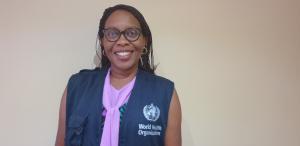Meet Team WHO: Dr Annet Kisakye, Immunization Officer, Uganda
A medical doctor with a master’s degree in Public Health, Dr Annet Kisakye ran medical wards in public and private hospitals in Kampala before joining the World Health Organization in 2001.
She began working as Uganda’s Immunization and Surveillance Officer, expanding her portfolio over time to include a range of vaccine preventable diseases and Integrated Disease Surveillance and Response. Dr Kisakye is also WHO’s focal person for introducing new vaccines in Uganda where she leads WHO’s COVID-19 response epidemiological team and is acting lead for the Immunization Vaccine Department and Family and Reproductive Health cluster.
What are you most proud of?
One of my most exciting moments was when I supported the introduction of the Ebola vaccine in Uganda in 2018. I was a Co-Principal Investigator, supervising over 100 people in this huge, urgent effort. This required the rapid vaccination of 6805 at-risk health workers in 13 districts between November 2018 and September 2019.
We also had to isolate and monitor four health workers on the border for symptoms of suspected Ebola virus disease, to prevent potential transmission. All were already vaccinated, but it was still a worrying time for them. No one died or became seriously ill, illustrating clearly that vaccines work and save lives.
Tell us about your current role
I am spearheading WHO’s support to Uganda’s COVID-19 vaccine rollout. It’s great to be helping ensure that more people will not get seriously ill and die from COVID-19 through vaccination.
I provide technical guidance on all areas of the COVID-19 vaccine rollout, but also support other areas of the broader vaccination programme, new vaccine introductions, and routine immunization strengthening.
What are the biggest successes and challenges in Uganda's COVID-19 vaccine rollout?
WHO helped Uganda develop its National Vaccine Deployment Plan quickly and comprehensively. This allowed us to get our first batch of vaccines through COVAX in early March. Leveraging the lessons learnt from rolling out Ebola vaccines helped to rapidly distribute COVID-19 vaccines across the country, with no major gaps, issues, or delays.
The biggest challenges include the lack of operational funds for the deployment of vaccines, some vaccine hesitancy among health workers, and the short shelf life of vaccines on arrival.
What drives your commitment to your work with WHO?
WHO will always lead in the field of global health and set crucial global standards and guidelines, and I’m proud to be a part of that. The Triple Billion targets are also exciting and have given me a push in terms of my deliverables as I seek to serve the vulnerable.



